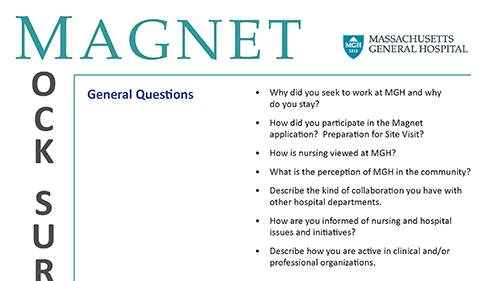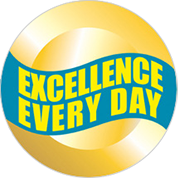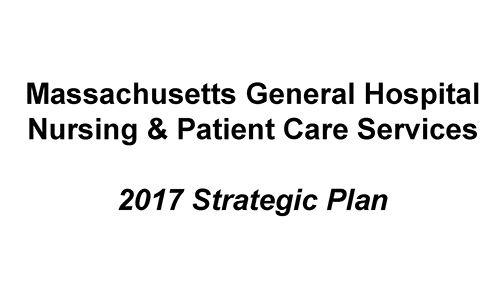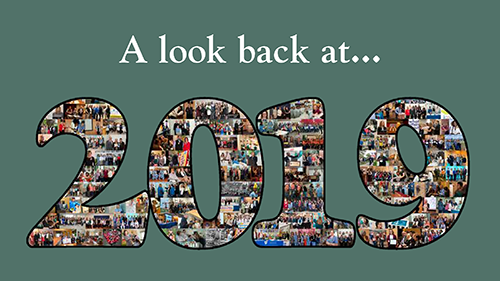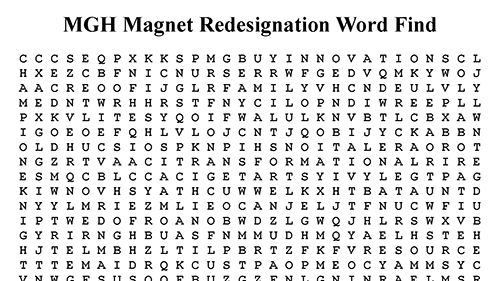Magnet© Recognition
Our Magnet Journey
Mass General was the first hospital in Massachusetts to achieve ANCC Magnet status in 2003. Re-designated in 2007, 2012, and 2018.
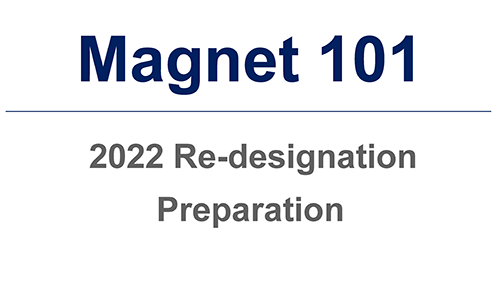
Magnet 101
View Presentation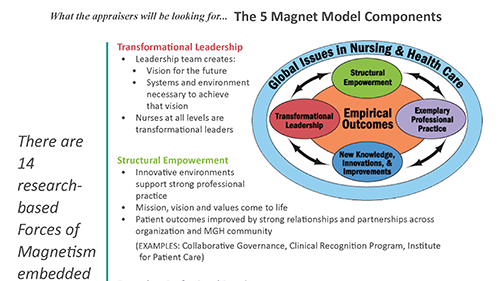
Magnet Compendium
Learn More about Magnet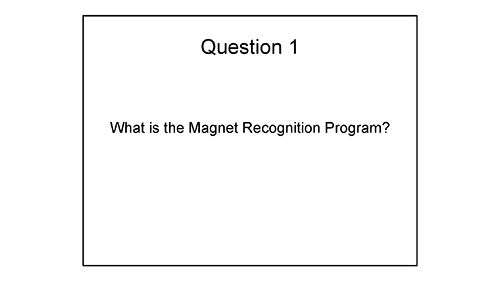
Magnet Flashcards
View FlahscardsTransformational Leadership: Transformational leadership is essential to meet the demands of the future.
Characteristics:
- Leadership for today and the future
- Visionary/influential leaders—at all levels—create a shared vision;
lead others to meet needs of the future - Challenging existing systems and proposing strategic, creative solutions to mitigate problems
- Ability to deal with constant change; comfortable with uncertainty
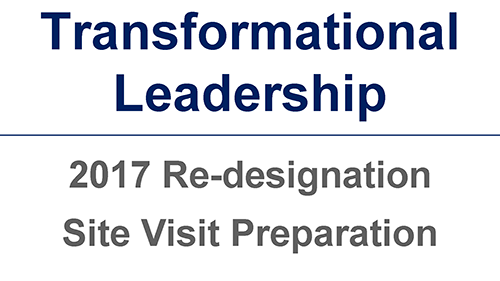
Transformation Leadership
View PresentationStructural Empowerment: Transformational leaders create foundations that bring the mission, vision and values to life and encourage professional nursing practice to achieve its highest level.
Characteristics:
- Transformational leaders create foundations that bring the mission, vision and values to life and encourage professional nursing practice to achieve its highest level
- Multi-directional communication among nurse leaders, bedside nurses and interdisciplinary teams
- Strong, collaborative relationships with other disciplines internally and in the community
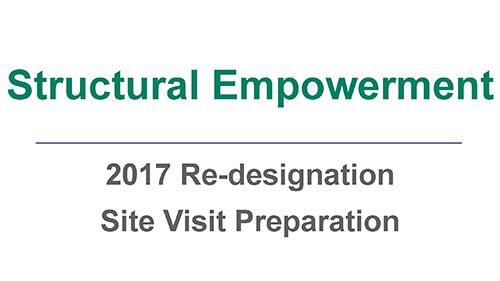
Structural Empowerment
View PresentationExemplary Professional Practice: Establishment of strong professional practice and what nursing can achieve.
Characteristics:
- It is about what nursing can achieve.
- It is about how nurses interact with patients, families, communications and the interdisciplinary team to impact positive patient outcomes.
- Allows nurses to work in an environment where autonomy and accountability help define quality patient care and best practices.
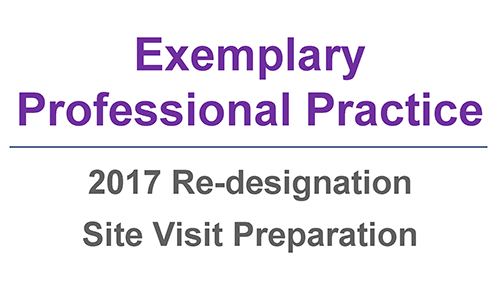
Exemplary
Professional Practice
View Presentation
New Knowledge, Innovations, and Improvements: Promote, foster and encourage new models of care, application of existing evidence, creation of new evidence and visible contributions to the science of nursing.
Characteristics:
- As exemplary professionals, nurses are accountable for using and expanding nursing knowledge.
- Magnet nurses are pioneers of our future.
- Innovations in nursing care, care delivery and the practice environment are the hallmark of Magnet organizations.
- Create new designs, models of care evidence and standards.
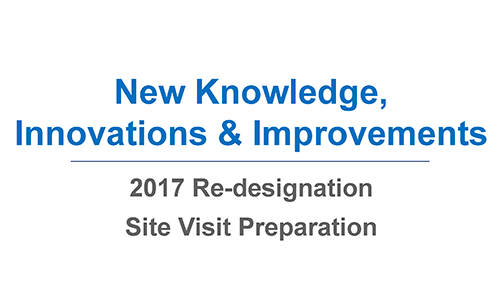
New Knowledge,
Innovation, and Improvements
View Presentation
Empirical Outcomes: Magnet outcomes are categorized in terms of clinical outcomes related to patient care; workforce outcomes; nursing sensitive indicators (NSIs) and patient and staff satisfaction (compared to benchmark data).
Characteristics:
- Focus on “What difference have you made?”
- Shift from structure and process to outcomes.
- Key indicators that paint a picture of the organization.
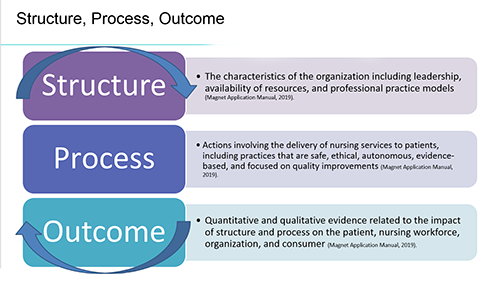
Emperical Outcomes
View PresentationOur Professional Practice Model is based on the following key components:
- Vision and values that affirm our work
- Standards of practice
- Sharing stories to make the often invisible components of practice, visible
- Professional development opportunities that promote life-long learning
- Philosophy of relationship-based care that cultivates relationships with patients/families, colleagues and self
- Reflective practice that guides advancement of career
- Decision-making that empowers clinicians to advance care
- Practice that is driven by evidence and grounded in research
- Commitment to innovation and intra-professional teamwork
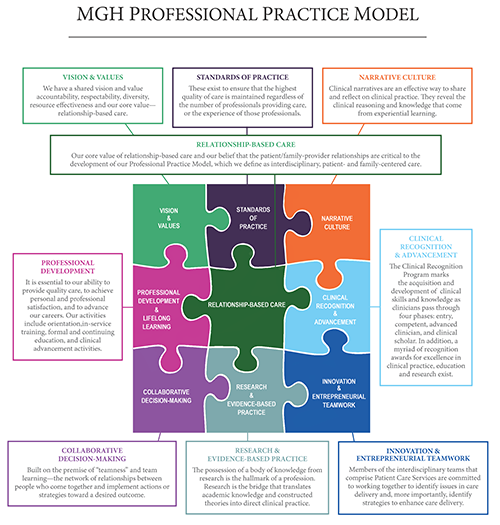
Professional Practice Model
View PPM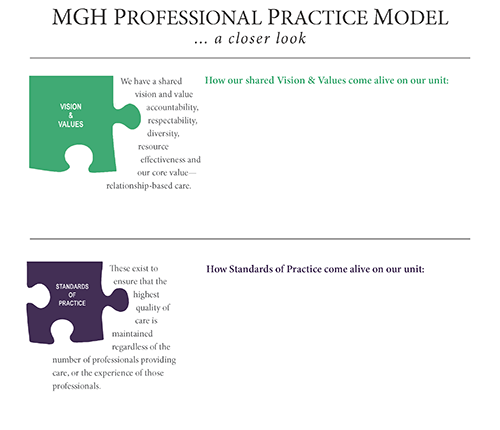
Professional Practice
Model Questons
View Questions
The Patient Care Delivery Model (PCDM) illustrates how relationship-based care, domains of practice, the Institute of Medicine’s six aims of quality improvement and empirical outcomes are integral parts of the care-delivery process. These four central components are symbiotically related, each one vital to the effectiveness of care and each one inter-dependent upon the others.
Relationship-based care is at the center of the PCDM, which speaks to the importance of knowing patients in order to provide the highest quality care and service.
Sharing the center are the six aims of the Institute of Medicine: ensuring that care is patient-centered; safe; efficient; effective; timely; and equitable. These objectives have become the pillars of our care-delivery model and the mainstay of our culture at Mass General.
The Domains of Practice hearken back to an earlier iteration of the model and speak to the importance of “doing for” and “being with” the patient in order to create an environment of optimal care and healing.
Finally, Empirical Outcomes refers to the critically important function of how we measure the impact of our work, encompassing clinical outcomes, patient satisfaction, the environment of care, and workforce morale.
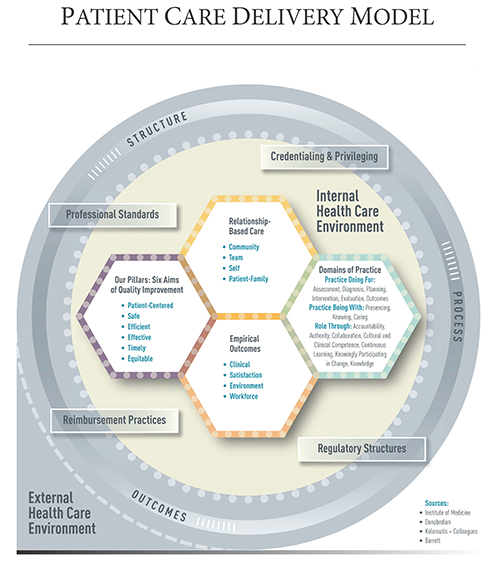
Patient Care Delivery Model
View PCDMWhat will happen during the four-day visit?
- The visit allows staff to showcase the excellent care that is provided to patients and families at the Mass General. The Appraisers will visit as many patient care units and practice areas as possible. The Appraisers want to speak with all members of the health care team, patients and families about the Mass General.
- The Goal: Evaluate the overall hospital environment and culture as one that promotes excellence in patient care and service. Be prepared. You could be called upon.
The Appraisers will...
- Visit as many patient care units and practice sites as possible, looking for evidence of empowerment, collaboration and excellence.
- Speak directly with clinical nurses and care team members, patients and families about how clinical practice is delivered and supported.
- Randomly select clinical nurses to meet with them for breakfast and lunch discussions.
- Meet with other key stakeholders, including committees, community members, affiliates, etc.
